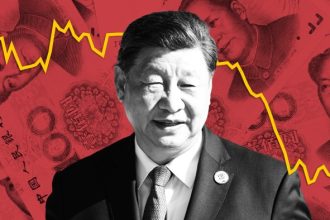Treasury’s top sanctions official Brian Nelson will travel to the southern border Tuesday as part of the department’s ongoing push to crack down on the cartels and illicit financial networks fueling the deadly fentanyl trade, Treasury officials told CNN.
Nelson’s trip – his second in sixth months – and a spate of recent sanctions activity is the latest indicator that Treasury is ramping up efforts to tackle the illegal fentanyl trade through actions that disrupt the supply chains funneling “precursor” chemicals from China to producers in Mexico where much of the deadly drug is made.
Nelson and Treasury officials will meet with fellow law enforcement representatives, including from the Department of Homeland Security and U.S. Customs and Border Protection, as well as private financial institutions and local officials.
“What we are doing is trying to be as effective as we possibly can in combining Treasury’s tools with the efforts that other US government agencies and allied governments are deploying in this space,” said Nelson, the under secretary for terrorism and financial intelligence at Treasury, in an interview with CNN.
The engagements over the 48-hour trip will provide officials an opportunity to discuss how Treasury’s tools and information can complement law enforcement and to learn about the big issues and patterns that agents are seeing on the ground. The trip is also aimed at exploring how trends and information from the extensive financial information Treasury collects can be helpful to the broader government-wide effort to quell the synthetic opioid epidemic.
Nelson, who will also be joined by the acting director of the Financial Crimes Enforcement Network (FinCEN) Himamauli Das, will visit Laredo and San Antonio in Texas on Tuesday and Wednesday.
In Laredo, Nelson will receive briefings on border operations from CBP officials at the city’s port of entry as well as discuss cargo processing and inspections.
“There’s a credible value in seeing that in person,” Nelson said.
In San Antonio, Nelson and Das will host a “FinCEN Exchange,” which is a public-private information sharing forum where Treasury can share the different patterns and connections they’re seeing with financial institutions, as well as discuss further ways the federal government can partner with the private sector to better spot red flags and identify illicit financial networks.
The department has been involved in the counter-narcotics business for decades, using its tools and financial expertise to both starve criminal organizations of critical financing through sanctions and blocking assets, as well as providing crucial financial data to other law enforcement and federal agencies.
“We can help disrupt financial flows and target the whole supply chain, starting with the precursor chemicals all the way down to distributors bound for US markets. And it’s not just sanctions,” Nelson said, pointing also to FinCEN’s financial mapping tools as well as Treasury’s focus on cooperating with Mexico to improve their capacity to trace and combat illicit finance.
“These tools, combined with financial mapping that our FinCEN team does, is very, very powerful insight,” he added.
Investigators from the Treasury, especially those at FinCEN, can access and share powerful financial data with enforcement bodies like the Drug Enforcement Agency, the Department of Homeland Security and others as they work to track and disrupt the fentanyl trade and drug suppliers.
Nelson also said that Treasury is “absolutely” looking to build on US Secretary of State Antony Blinken’s latest engagements in China, which included discussing where the two nations could cooperate on curbing the flow of precursor chemicals from China. Blinken, who traveled to Beijing last month, said both sides agreed to “explore” establishing a working group on the precursor chemicals used to produce the deadly synthetic drug.
There has been a government-wide push to curb synthetic opioids like fentanyl, which are the main driver of overdose deaths in the US. According to the US Centers for Disease Control and Prevention, there has been a more than seven-fold increase overall in deaths from 2015-2021, and despite a recent slowing, overdose deaths still hover near record levels and remain the third leading cause of death in adolescents aged 19 and younger.
In April, the Biden administration announced a broad effort to target the production and distribution of fentanyl, which included criminal charges from the Department of Justice and a host of new Treasury sanctions.
It was an announcement that built off of an executive order signed in 2021 that expanded Treasury’s authorities to target the distribution chains of fentanyl and other narcotics, which Nelson said has been critical to helping Treasury “increase the pace at which we are able to target and designate the key nodes in fentanyl distribution.”
Since then, Treasury has continued to issue sanctions against precursor chemical supply networks, particularly in China, as well as other corrupt activity like arms trafficking and money laundering that helps support the trade.
Read the full article here




